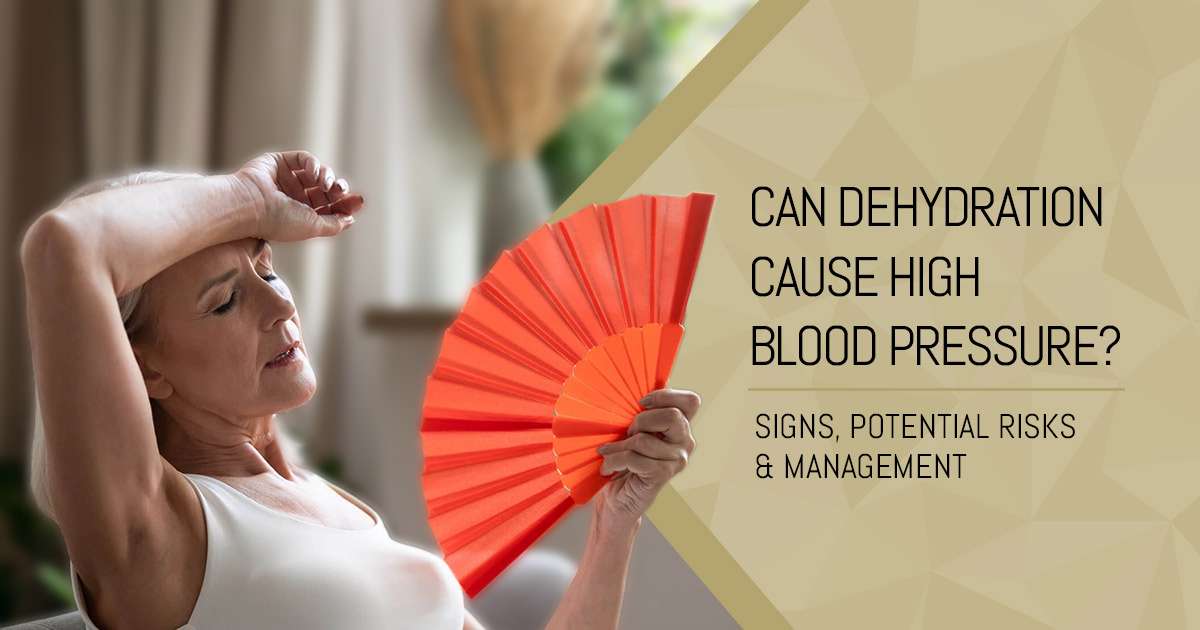Can Dehydration Cause High Blood Pressure? Signs, Potential Risks & Management

From a young age, we’ve been told by mothers, doctors, and nearly everyone around us to “drink lots of water to stay healthy.” This advice is more important than it seems. Water plays a crucial role in keeping our bodies running smoothly—it helps with digestion, keeps our temperature in check, and even boosts our energy and mood.
But what happens if you skip out on drinking enough water? The effects can be more serious than just feeling thirsty. Without enough water, you might become dehydrated, which can lead to a variety of health issues. One study even shows that mild dehydration can impact your mood, thinking, and physical abilities. Worse still, if dehydration becomes a regular issue, it can lead to bigger problems like a rise in blood pressure, something many people don’t realize.
Understanding Dehydration and Its Impact
Dehydration is when your body loses more water than it takes in and doesn’t have enough fluid to work properly. Water is crucial because it helps with digestion, keeps your skin healthy, and supports many other body functions. Dehydration can happen fast, especially in hot weather, during exercise, or if you’re sick.
When dehydration begins, your body exhibits several signs that it needs more water, including:
- Thirst and dry mouth
- Dry skin
- Fatigue
- Headaches
- Dizziness
- Reduced urination
Prolonged dehydration can lead to more serious health problems, such as kidney issues or urinary tract infections. Another significant concern is that chronic dehydration can cause high blood pressure.
The Link Between Dehydration and High Blood Pressure
Dehydration and high blood pressure are linked because when your body doesn’t have enough water, it tries to save what little it has by narrowing the blood vessels. This narrowing makes the blood pressure go up as the heart works harder to pump blood through smaller spaces. When dehydration continues, it puts more pressure on your heart, causing your blood pressure to rise.
Look out for these signs that your high blood pressure might be due to dehydration:
- Faster heart rate
- Feeling lightheaded or dizzy, especially when you stand up
- Continuous headaches
- Feeling extremely tired or weak
The effects of dehydration-related high blood pressure can be serious. It raises the risk of heart problems, strokes, and other issues involving the heart and blood vessels. For those who already have high blood pressure, dehydration can make managing it more difficult.
It’s crucial to notice these signs early. You can effectively manage your health and avoid more serious issues by rehydrating and seeking medical advice when you notice symptoms associated with high blood pressure and dehydration.
How to Manage and Treat High Blood Pressure from Dehydration
Dealing with high blood pressure caused by dehydration involves drinking more water and making some lifestyle changes. Here’s how you can handle it:
1. Stay Hydrated
Start by drinking more water—aim for about 8-10 glasses a day. If you are active or it’s hot outside, drink even more. Use a water bottle with marks or an app to help you keep track of how much you’re drinking.
2. Watch Your Diet
What you eat matters. Cut down on salt to help keep your blood pressure in check—try to stay under 1,500 mg of sodium daily. For flavor, use herbs and spices rather than processed foods. Eating plenty of water-rich foods like cucumbers and watermelon also helps.
3. Exercise Regularly
Exercise is key. Try activities like walking, swimming, or cycling for at least 150 minutes each week. This not only helps your heart but also lowers blood pressure. Remember to drink water before, during, and after you exercise to replace what you sweat out.
4. Limit Caffeine and Alcohol
Be mindful of how much caffeine and alcohol you consume since both can dehydrate you. Try to limit coffee to one or two cups a day, and keep alcohol intake moderate.
5. Check Your Blood Pressure
Regularly monitor your blood pressure at home. This will help you see how well your lifestyle changes are working. Keep a log of your readings to share with your doctor.
6. Seek Medical Advice
If changes at home don’t bring your blood pressure down, talk to your doctor. They might suggest medication or other treatments. Also, learn to recognize signs of dehydration, like feeling very thirsty or having dark-colored urine, so you can act quickly.
Cherish Your Health: A Wealth Beyond Measure
Drinking water might seem like a small habit, but it’s a great way to start taking care of your health. Staying hydrated and making simple changes in your daily routine can greatly improve how you feel. Remember, good health is one of the most valuable things you can have. Taking steps like drinking enough water, eating well, and exercising regularly can boost your energy and keep you safe from many health problems. Every healthy choice you make today helps ensure a happier, healthier future. Make your health a priority, and enjoy the benefits of feeling your best.

